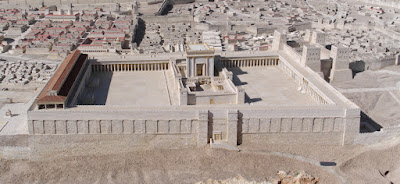“But ye are come unto mount Zion, and unto the city of the living God, the heavenly Jerusalem, and to an innumerable company of angels, To the general assembly and church of the firstborn, which are written in heaven, and to God the Judge of all, and to the spirits of just men made perfect.” Hebrews 12:22-23
If you are like me, you may have had some problem pinning down just what Mount Zion represents, particularly in the New Testament. Zion is mentioned over 160 times in the Old Testament, but only a few times in the New. The very first time Zion is mentioned in the Bible gives us it's basic definition.
“And the king and his men went to Jerusalem unto the Jebusites, the inhabitants of the land: which spake unto David, saying, Except thou take away the blind and the lame, thou shalt not come in hither: thinking, David cannot come in hither. Nevertheless David took the strong hold of Zion: the same is the city of David.” 2 Samuel 5: 6-7
This verse has the potential for some confusion, unless you realize that both Bethlehem and Jerusalem were called "the city of David; Jerusalem because he made it his capitol city and Bethlehem because it was where he was born.
“And many people shall go and say, Come ye, and let us go up to the mountain of the LORD, to the house of the God of Jacob; and he will teach us of his ways, and we will walk in his paths: for out of Zion shall go forth the law, and the word of the LORD from Jerusalem.” Isaiah 2:3
Interestingly, this was most likely the very same mountain where Abraham offered his son Isaac in a picture of God the Father giving his own son, Christ Jesus, which was the ultimate fulfilment of all the Old Testament sacrifices. But the reason I mention it, is that it pinpoints Zion as the house of the God of Jacob, or in other words, the temple. To emphasize the fact that the temple was not only God's house, but that it was his dwelling place, let’s consider Joel 3:17
“So shall ye know that I am the LORD your God dwelling in Zion, my holy mountain: then shall Jerusalem be holy, and there shall no strangers pass through her any more.”
Just as God dwelt in the Tabernacle (literally “tent”) before, after Solomon built the Temple in Jerusalem, he chose that as his dwelling place here on earth. Of course we know that God resides in Heaven, and he is present everywhere, but the Tabernacle and the Temple were places where God chose to manifest himself in a special way at those times. Now let's look some verses that use Zion in a more spiritual sense.
“Therefore the redeemed of the LORD shall return, and come with singing unto Zion; and everlasting joy shall be upon their head: they shall obtain gladness and joy; and sorrow and mourning shall flee away.” Isaiah 51:11
”And I have put my words in thy mouth, and I have covered thee in the shadow of mine hand, that I may plant the heavens, and lay the foundations of the earth, and say unto Zion, Thou art my people.” Isaiah 51:16
Here we see Scripture refers to Zion as his people and as the redeemed of the Lord. One of the Old Testament verses that is often quoted in the New, is this:
“Therefore thus saith the Lord GOD, Behold, I lay in Zion for a foundation a stone, a tried stone, a precious corner stone, a sure foundation: he that believeth shall not make haste.” Isaiah 28:16
One person who quotes that in the New Testament is the Apostle Peter:
“To whom coming, as unto a living stone, disallowed indeed of men, but chosen of God, and precious, Ye also, as lively stones, are built up a spiritual house, an holy priesthood, to offer up spiritual sacrifices, acceptable to God by Jesus Christ. Wherefore also it is contained in the scripture, Behold, I lay in Zion a chief corner stone, elect, precious: and he that believeth on him shall not be confounded. Unto you therefore which believe he is precious: but unto them which be disobedient, the stone which the builders disallowed, the same is made the head of the corner, And a stone of stumbling, and a rock of offence, even to them which stumble at the word, being disobedient: whereunto also they were appointed. But ye are a chosen generation, a royal priesthood, an holy nation, a peculiar people; that ye should shew forth the praises of him who hath called you out of darkness into his marvellous light; Which in time past were not a people, but are now the people of God: which had not obtained mercy, but now have obtained mercy.” 1 Peter 2:4-10
Note that Peter states that New Testament believers are built into a spiritual house, whose chief corner stone is Jesus Christ. Keeping that in mind, and to clarify, let's look at something the Apostle Paul wrote to the church at Ephesus:
“Now therefore ye are no more strangers and foreigners, but fellowcitizens with the saints, and of the household of God; And are built upon the foundation of the apostles and prophets, Jesus Christ himself being the chief corner stone; In whom all the building fitly framed together groweth unto an holy temple in the Lord: In whom ye also are builded together for an habitation of God through the Spirit.” Ephesians 2:19-22
God chose to live in the Temple, also called Zion in Old Testament times. Jesus Christ is the chief corner stone of that temple. Jesus Christ is also the chief corner stone of the New Testament Church which is also the place where God chooses to live. Does this mean that Christ is the cornerstone of two separate spiritual buildings? Paul give us that answer in that same letter to the Church at Ephesus.
“For this cause I Paul, the prisoner of Jesus Christ for you Gentiles, If ye have heard of the dispensation of the grace of God which is given me to you-ward: How that by revelation he made known unto me the mystery; (as I wrote afore in few words, Whereby, when ye read, ye may understand my knowledge in the mystery of Christ) Which in other ages was not made known unto the sons of men, as it is now revealed unto his holy apostles and prophets by the Spirit; That the Gentiles should be fellowheirs, and of the same body, and partakers of his promise in Christ by the gospel:” Ephesians 3:1-6
(In other words, Old and New Testament saints are part of the same body!)
In conclusion I would contend that the term Zion has several meanings. First would be the literal physical place of the Temple in Jerusalem. But Scripture also uses Zion in a spiritual way to describe the whole city of Jerusalem. In an even more spiritual sense, and perhaps most important, the Bible uses Zion as a name for the Old Testament saints, and later to describe the Church, two parts of the same body.
As with everything in the Bible, it is important to understand what the Lord means to be read literally and what he means to be read figuratively. With that in mind, contemplate the following scripture passages:
“For the LORD hath chosen Zion; he hath desired it for his habitation.” Psalms 132:13
“Sing and rejoice, O daughter of Zion: for, lo, I come, and I will dwell in the midst of thee, saith the LORD.” Zechariah 2:10
“Thus saith the LORD of hosts; I was jealous for Zion with great jealousy, and I was jealous for her with great fury.” Zechariah 8:2 (note that Zion is referred to as she, just as Israel was often referred to as God's wife and the church is called the bride of Christ)
“Remember thy congregation, which thou hast purchased of old; the rod of thine inheritance, which thou hast redeemed; this mount Zion, wherein thou hast dwelt.” Psalms 74:2
I would suggest that Zion, today manifested as the New Testament Church, remains the place where God lives through the indwelling of the Holy Spirit in his people Despite the many apostate churches which have abandoned sound doctrine and give Christianity a bad name; despite all the faults and shortcomings of those churches who remain faithful; Zion remains the place where the LORD has chosen to dwell!

